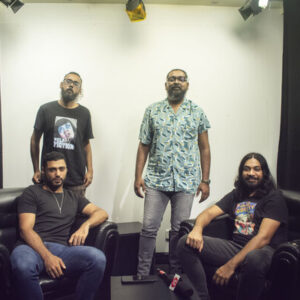From playing Curtis for two seasons on ABC’s megahit, Black-ish to starring alongside Tracy Morgan and Tiffany Haddish in the TBS hit series, The Last O.G., multi-hyphenate actor-writer-entrepreneur, Allen Maldonado, is a modern-day renaissance man. He’s the ideal fit for the role of Cousin Bobby, Tracy Morgan’s instigating but well-meaning sidekick. The Last O.G., created by Oscar winning filmmaker, Jordan Peele, is part of a 2018 wave of #blackexcellence sweeping Hollywood.
The show’s irreverent humor is inspired, thought provoking, and hilarious, as it manages to tackle the issues of post-incarceration societal re-entry, fatherhood and the gentrification of Brooklyn, New York.
Maldonado’s character, Cousin Bobby, attempts to help Tracy Morgan’s character “Tray” in his quest to turn his life around and put his family back together. Morgan and Maldonado are a classic comedic team in the making.
Allison Kugel: Jordan Peele is the creator of this show and he covers so many issues, while making people laugh. The Last O.G. examines the concept of getting a second chance after being incarcerated, the gentrification of Brooklyn, and the importance of fatherhood. Beyond the laughs, what is The Last O.G. communicating to its audience?
Allen Maldonado: What makes this show special is that we have a lot of dramatic tones because of the subject matter. TV audiences go in with the assumption that this show is a sitcom, but I’ve heard people say many times that the show is a lot deeper than they thought it would be. Same as in real life; there are things that are fall out of your chair funny, and other things that will make you fall out of your chair from crying. We have a perfect balance of that in our show.
Allison Kugel: You have a history with Tiffany Haddish going back to the beginning of both of your careers. Tell me about working with Tiffany, back then, and now…
Allen Maldonado: Just being able to see her star rise over the past couple of years, knowing her several years back, when we did a television pilot that never saw the light of day… from our first interaction meeting her on that set, she was hilarious back then. To be able to see her grow into the star she is, and the beautiful person she is, I couldn’t be prouder to call her my co-star on this show.
Allison Kugel: What qualities did you see in her back then that made you say, “She’s going places.”?
Allen Maldonado: She was true to herself and organically real, with a leading type of mentality. That’s a quality that Tracy [Morgan] shares as well. A lot of superstars have that confidence to say, “This is who I am, and take it or leave it.” She was always assertive in that way, and her style of comedy always resonated with me. It’s real and coming from her truth. The world is now seeing her talent, and it’s her time.
Allison Kugel: Your character, Cousin Bobby, is a classic comedic sidekick. There have been many classic comedic sidekicks throughout television history. Did you borrow inspiration from any of those?
Allen Maldonado: Cousin Bobby came from a real place. I didn’t really draw from a past television character.
Allison Kugel: Did you draw inspiration from your own life?
Allen Maldonado: I drew upon my life and different family members I knew growing up, and that one cousin who has always been by himself and when he finds you it’s like he’s being resuscitated back to life. Suddenly, he’s driven to do things he was never driven to do before, because of your presence and the way he looks up to you. That’s where Cousin Bobby came from for me.
Allison Kugel: You recently spoke with Janice Williams, a reporter at Newsweek, about gentrification and how it’s covered on The Last O.G. Tracy Morgan’s character, Tray, goes away in 2002. When he’s released from prison in 2017 and he comes back to his old neighborhood in Brooklyn, it’s this upper middle class, suburbanized enclave, and he has to adjust. What are your thoughts on gentrification of certain urban communities?
Allen Maldonado: There are pros and cons. Being that certain urban communities were underserved, it’s unfortunate that when these communities are finally getting served, the people that were in need are being forced out. I grew up in a rough neighborhood and didn’t have much. It’s one of those things where if we had a little more assistance or a little more help, there are so many other individuals aside from me who would have made it out of those tough circumstances. When help finally arrives and you are unable to receive it, it’s sad. Growth is always good, but not being able to service individuals who need it the most, that’s my problem with it. Being able to co-exist, it’s what I would push when it comes to gentrification. There has to be balance.
Allison Kugel: Will the show’s creator, Academy Award winner Jordan Peele, make an on-camera appearance next season?
Allen Maldonado: I don’t know. I would love for that to happen! But I don’t know. We will see…
Allison Kugel: Growing up in your neighborhood, did you have someone you looked up to the way Cousin Bobby looks up to Tray on The Last O.G.?
Allen Maldonado: Yes, I did. I grew up around some rough characters, and some that would be considered the underbelly of society. I had the opposite of what most people would think these individuals would influence you to do. They kept me away from being in gangs. They kept me away from selling drugs. They kept me away from doing a lot of negative stuff because they saw something special in me… I have nothing but good things to say about the O.G.s that I grew up with.
Allison Kugel: Better to have a flawed father in the picture whose made bad decisions and been incarcerated, or no?
Allen Maldonado: No matter what position a father is in he’s going to be flawed. It all depends on the individual. Having proper guidance doesn’t necessarily fall upon your father or your mother. Your surroundings by the people in your life will inspire you and inject inspiration and hope into your life. I grew up without a father. My father passed when I was young, so if he was here I don’t know how it would be. I’ve been driven by having to be independent and by not having that presence in my life, and sort of being my own father. I don’t know if I would be as driven as I was if he was here.
Allison Kugel: Has Tracy Morgan discussed his 2014 accident with you, and how it changed him as a person and as an artist?
Allen Maldonado: We discussed it because we share similar near-death situations. I was twenty-one and I was hit by a drunk driver, walking, and the driver was going 65 mph. We both can attest to the fact that scientifically we’re not supposed to be here.
Allison Kugel: But you are supposed to still be here, because you’re here…
Allen Maldonado: That is correct. The impact that something like that, that powerful of a situation and you being able to stand strong again with a certain amount of faith and understand that you have a purpose that, no one that shares that kind of story can explain it to you. It’s like, how do you explain love? How do you describe it? These near-death situations, the power of God, and the strength of your spirituality growing from this near fatal event, we both share that, and we’ve had conversations about how the grass is greener, the sky is bluer. And we both understand that you’re not promised tomorrow. Now I live by a motto that every time I go to bed I ask myself a question, “If I don’t wake up tomorrow, can I look down at myself, at my body, and say I worked as hard as I could to fulfill my dreams?” If I can’t say that, then my day was not fulfilled. That’s how I live my life now. I would never want to look back once this chapter is closed and say, “I could have done more.”
Allison Kugel: You were a writer for the Starz series, Survivor’s Remorse, about a young man from an underserved urban community who finds fame and fortune as a basketball player, and he feels guilty about his success. Do you have survivor’s remorse, or survivor’s guilt, about your success?
Allen Maldonado: I do. That’s why I do so much for the community. I have my kid’s foundation called Demo Nerds. We teach film acting and filmmaking to foster kids. My survivor’s remorse is in understanding the psychological difficulty that these kids have, thinking that they don’t have options. It’s very difficult for a child to listen to their parents, go to school and do everything right, when they’re struggling to keep the lights on and put food on the table, and everybody that’s doing something wrong is going around with expensive cars, jewelry, and things that people want. For me, visual representation is everything. Speaking with these kids and letting them see that there are successful individuals who look like them, sound like them, talk like them in different areas of business, entertainment, or what have you, is what I strive to inject into the community.
The Last O.G. airs Tuesdays at 10:30 ET/9:30 CT on TBS. Check local listings.
Allison Kugel is a syndicated entertainment and pop culture journalist, and author of the book, Journaling Fame: A memoir of a life unhinged and on the record. Follow her on Instagram @theallisonkugel.
This interview was produced in partnership with TireAgent – the easiest way to replace your tires. Installation at home, or anywhere you choose; and with The Wellness Universe – Mind, Body, Spirit, Planet… your complete wellness resource.
Photo Credits: Courtesy of TBS














